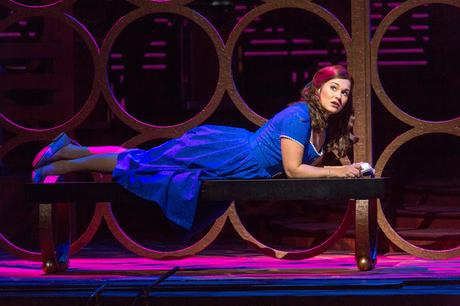by Paul J. Pelkonen

Olga Peretyatko in Act I of the Met's current Rigoletto.
Photo by Richard Termine © 2018 The Metropolitan Opera.
It has been argued elsewhere on this blog that Verdi's opera, which is based on the Victor Hugo play Le roi s'amuse (about the King of France and his libertine sex life) chose Mantua as its new locale for the simple reason that the Gonzaga family was no longer ruling that Italian city when the opera premiered in 1851. By that logic, the Vegas setting works, and the addition of gaudy neon, bright colors and a retro aesthetic (right down to the metallic sparkle paint job on Sparafucile's car) has the virtue of injecting some color into what can be a drab and depressing story.
This glitzy show was tethered firmly to earth by baritone Željko Lučić . Rigoletto is a role he has sung at the Met for the last decade, and he knows it cold, playing the nuances of the drama with a Shakespearean finesse. His voice is dry and sometimes barks under pressure, but there is great intelligence in his physical movement as well as his use of effect in the great arioso monologues that define the character.
Mr. Mayer reimagined the hunchbacked court jester as a standup comic, the opening act for the popular lounge singer "The Duke." Clad in an argyle sweater (a nod to the diamond patterns of a Harlequin costume) Mr. Lučić emerged from the crowd to rivet the listener with his first lines. The little scene with Sparafucile in Act I and the "Para siamo" monolog were perfectly placed, sung with nuance. Later, heroic moments: the furious address to the courtiers, the Act III trio and the final scene reached a peak of dramatic intensity that was at times painful to watch, but not to listen to.
From her entry writing notes in a pink notebook, soprano Olga Peretyatko embodied Gilda as a full and complex role. The jester's daughter is an innocent, some might say a willfully blind figure: a colleague at intermission speculated that there was no way she not realize that her would-be suitor (and later her rapist) was the biggest singing star in the casino.) Her impressive command of ornamentation was matched by her ability to cut through over orchestra and ensemble alike. This was an intense and wholly committed performance of a character on a path from childhood to adulthood to certain destruction in an involving and inexorable way.
Stephen Costello returned as the Duke, sounding taut and a little strained in "Questa o quella" despite the undemanding tessitura of Verdi's score. Still, he moved well, caught the essentially cynical nature of the character and produced some pretty, though dramatically unfocused notes in the Act II arioso. Finally sang "La donna é mobile" (three times) with an emphasis on the Duke's cynical nature, although his voice was swallowed up by the Met's cavernous acoustic.
As Sparafucile, bass Andrea Mastroni sang with attractive tone and a bantam presence that recalled the vintage villainy of Samuel Ramey. He has a pleasing, dark voice, and tossed off a deep note at the end of the Act I scena with Mr. Lučić that drew the first real round of applause from the house. In Act III, Mr. Mastroni played up the unsavory incestuous implications of the assassin's relationship with his sister and partner-in-crime Maddalena. Mezzo Oksana Volkova was both voluptuous of tone and body in this part, adding to the sense of depravity and holding down the key low notes in the great quartet. Conductor Pier Giorgio Morandi wrung power and meaning from the Met orchestra, making an average night at the opera gripping--just as it should be.

